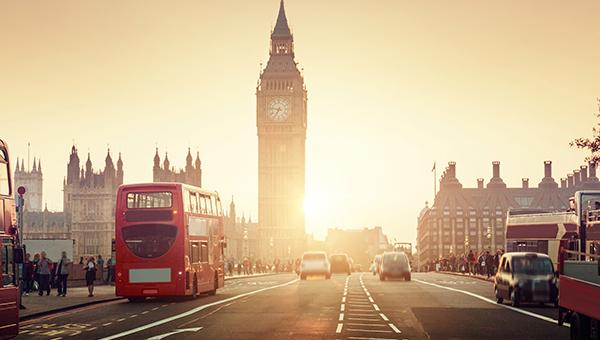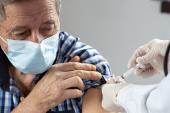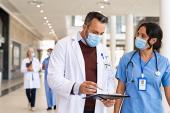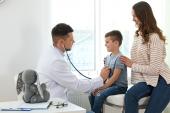Cardiologist Tests Positive for Omicron COVID-19 After Trip to PCR London Valves
So far organizers say this is the only known case and that the meeting took major precautions. Still, the news is dimming hopes.

One cardiologist who travelled to England to attend PCR London Valves has tested positive for the Omicron variant of COVID-19, after returning to his home country.
On November 30, Elad Maor, MD, PhD (Sheba Medical Center/Tel Aviv University, Israel), announced on Twitter that he tested positive for COVID-19 after attending the structural heart meeting at the ExCel Center in London. Maor tested positive despite being fully vaccinated with three doses of the Pfizer/BioNTech mRNA vaccine. He does not know exactly where or how he contracted the virus.
“By definition, it would be described as mild disease, even though I had a fever and I was in bed for 48 hours,” Maor told TCTMD. “I’m relatively young—I’m 45—but I’m not overweight, I don’t smoke, and I exercise regularly. I don’t have any comorbidities. I’m healthy and fully vaccinated. You’d expect a walk in the park. Well, it’s not. It’s definitely not.”
Fortunately, Maor has not required oxygen or any medical support. Four days into the infection, he’s eating and drinking again, but said he still feels “profoundly weak.” Some of the early reports about the Omicron variant have suggested the infection might result in a mild case of COVID-19, but Maor is doubtful. “If somebody is 20 years older than me, for example, say my in-laws,” he said. “They’re in their 70s with some chronic conditions. The same disease for them might be a hospitalization or an intubation, or even a risk of death.”
Officials for PCR London Valves have posted an advisory notice on their website alerting participants to the COVID-19 infection.
“As per our protocol, since the reported case comes less than a week after the end of PCR London Valves, we want to inform you so that you may decide the best course of action for yourself, if any,” the alert states. “The National Health Service (NHS) of the United Kingdom is responsible for tracking, tracing, and liaison with contact cases and they will contact you if necessary.”
Patrick Jolly, Director Strategic and Market Development PCR at the Europa Group, said they were first alerted to Maor’s case on Twitter. Jolly said that all participants were required to present a valid health pass—they could not enter the ExCel Center without proof of vaccination—and were strongly encouraged to wear masks while attending the meeting. Masks, along with hand sanitizer and disposal bins for used protective equipment, were readily available to all participants.
“We put everything that was in our power to give people a safe environment,” said Jolly. “As you can understand, the health, safety, and well-being of everyone who was [in attendance] was our number one priority.
Romain Despax, Director of Operations PCR at the Europa Group, said that roughly 70% of the meeting’s 1,200 attendees, including the organizing team, came from outside the United Kingdom. All were required to record details of their trip, including arrival, departure, and where they were staying. Thus far, organizers have received no other notifications of COVID-19 infection.
The detection of Omicron, officially known as B.1.1.529 beyond southern Africa where it was first documented, is fueling fears that it may already be in circulation. The World Health Organization (WHO) has labelled it a “variant of concern,” with officials still unsure just how deadly or transmissible the variant may actually be compared with other strains. It is also not known if current vaccines will protect against infection or if the new variant poses a greater risk of reinfection, according to WHO.
Israel has since locked down travel for the next 14 days and is barring entry to all foreign nationals. Other countries, such as Brazil, Canada, several from the European Union, and the US, have placed restrictions on travel from various southern African countries after the Omicron variant was identified by researchers in South Africa.
The Time Line
Maor arrived in London with his wife on Friday, November 19, and underwent COVID-19 testing the following day as required by British health authorities. To return to Israel, which he did on Tuesday night after attending the 3-day meeting, a negative COVID-19 test was required within 72 hours of takeoff. Maor had that second COVID-19 test on Sunday. Finally, after arriving in Tel Aviv at 4 AM on Wednesday morning, he had another COVID-19 test at the airport. All three tests, which he did only because they were required for travel, were negative.
On Thursday, November 25, Maor went back to work, including a shift in the catheterization laboratory. Friday night, he began to feel under the weather after going out to dinner with family. He suspected the flu, but his wife, a family physician, urged him to take another COVID-19 test the next morning. That test on November 27 turned out positive. For all cases where infection is suspected to have occurred outside the country, the Israeli government is testing for the Omicron variant, and Maor was told he’s the third known Omicron case in the country.
Since his positive test, Maor has reached out to approximately 100 people that he came into contact with during the past week, including his family, patients, and colleagues. All have undergone PCR testing and just one person tested positive for COVID-19—a cardiologist he traveled with by car to attend a meeting after coming back from London. Maor’s colleague is asymptomatic and healthy.
Meeting organizers should not be blamed for his infection, said Maor, stressing that they took every precaution possible to ensure a safe meeting. While there were signs throughout the venue reminding participants to wear their masks, Maor said people did, occasionally, let down their guard.
“If you look at a picture of the opening ceremony, maybe half of the people were wearing masks and maybe half were not,” he said. “There was food, there was coffee. So naturally during lunch break, people took their masks off. In general, people at that time felt a little bit at ease. Many already had the booster, and you needed [proof of vaccination] to get into the venue.”
In addition, Maor said he took the London Underground and Docklands Light Railway from his hotel in Islington to the venue in East London. “I’d say less than 50% on the tube were wearing a mask,” he said. “I was wearing a mask, but unfortunately I wasn’t wearing the N95, just a surgical mask.” He added that people can’t be forced to wear a mask and that there “has to be some level of personal responsibility.”
Despite the infection, Maor said that he has no regrets, adding that he plans to attend EuroPCR in 2022. For him, in-person meetings are an invaluable way to connect with colleagues and learn about new research. Online meetings and Zoom just don’t cut it.
Nonetheless, Maor said his personal circumstances—being relatively young and otherwise healthy—are important factors he considers when assessing the risks and benefits, and that the decision wouldn’t necessarily be same for everybody.
Michael O’Riordan is the Managing Editor for TCTMD. He completed his undergraduate degrees at Queen’s University in Kingston, ON, and…
Read Full Bio




Comments